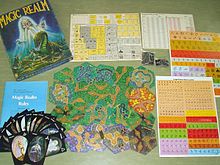- Magic Realm
-
Magic Realm 
Designer(s) Richard Hamblen Publisher(s) Avalon Hill Publication date 1979 Players 1–16 Age range 12 and up Random chance Low Magic Realm is a fantasy adventure board game designed by Richard Hamblen and published by Avalon Hill in 1979. Magic Realm is more complex than many wargames and is somewhat similar to a role-playing game. It can be played solitaire or with up to 16 players and game time can last 4 hours or more. The game board is a type of geomorphic mapboard constructed of large double-sided hexagon tiles, ensuring a wide variety of playing surfaces.
A second edition of the rules, changing the rulebook format and some of the game play, was published in 1986 and included in those games sold after that date. Magic Realm has been out of print since 1998, when Avalon Hill went out of business. Due to its uniqueness and complexity, the game has achieved cult status with some gamers. Some of these have written an unofficial 'Third Edition' of the rules that clarifies many of the game's ambiguities. Many websites exist today to promote the game.
Gameplay
In the game a player takes one or more of the sixteen different characters offered in the game. Each character has different strengths and weaknesses, and different allies and foes among the native groups and visitors that can appear on the board. Once the character is chosen each player chooses individual victory conditions based on 5 categories: Great Treasures, Spells, Fame, Notoriety and Gold.
The player allocates between 2-5 points (depending on the level he plays at) to the categories in any way he wishes. The allocation usually corresponds to the type of character played. The player will then attempt to obtain these goals through fighting with monsters, trading and various quests and searches for treasure and items, and encounters with other characters and the various beings in the Realm.
Example: the Swordsman might choose 2 point in Great Treasures, 1 in Fame and 2 in Gold, meaning that to win he needs to have 2 great treasures, 10 fame, and 60 gold pieces. As the Swordsman has no magical ability he would not be after spells. Another character like the Wizard might choose differently, perhaps decreasing the needs for gold and great treasures to obtain spells for casting. Winning the game is quite challenging, and the chances of your character dying at the hands of monsters, hostile natives, or another perfidious character are significant.
The game has many unique features that were groundbreaking for its time that can make repeat play very enjoyable: notably the random distribution of treasure sites, monsters, treasures, and spell cards and the novel board which is built collectively by the players from hexagonal tiles that can be put together in literally millions of ways following a few simples rules to insure the connectivity of the paths. The ability of characters with magical ability to enchant hex tiles during play, causing the tiles to flip over and changing the paths and adding magic colors to the tile is another unique and intriguing feature.
However the setup preparation time is extremely long. Preparing the treasure setup card can take 30 min or more and the actual building of the board before you can begin can also take a fair amount of time particularly for the inexperienced player. In addition the unique combat system takes some getting used to. To aid in this effort the game system allows one to play a truncated version of the game known as encounters. In the Second Edition rules there are 4 encounters (as opposed to 7 in the First Edition) each one introducing a different game concept to the player. This allows you to master one part of the rules before learning the next section.
External links
Categories:- Adventure board games
- Fantasy board games
- Board games with a modular board
Wikimedia Foundation. 2010.
